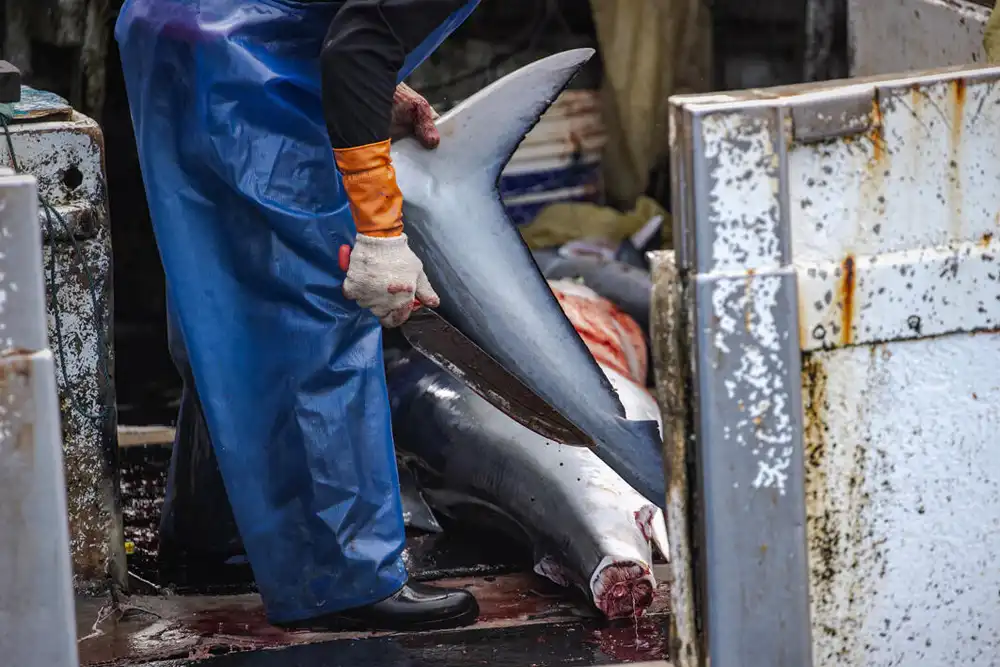
By DIVE Staff
Greenpeace investigators have released a report documenting the destructive fishing practices and poor labour conditions of Taiwanese longlining fishing vessels. The report revealed that three sharks per hour were killed in just a short time frame in a single area.
The investigation was conducted by the crew of the Greenpeace ship, Rainbow Warrior, during a five-week expedition in the North Pacific Ocean. The observations were made around the Emperor Seamounts, a chain of more than 800 seamounts and at least 80 underwater volcanos stretching some 3,000km northwest from the Hawaiian Islands to the Aleutian Islands, which run between the US State of Alaska and Kamchatka Krai in far eastern Russia.
The extensive seamount range is recognised by Greenpeace as a ‘priority site for ocean protection’ under the new Global Ocean Treaty – also known as the High Seas Treaty – the first-ever global agreement to protect the open ocean, which was signed into effect by the United Nations in September 2023.
Illegal, unreported and unregulated fishing has traditionally been one of the biggest threats to the biodiversity of the Emperor Seamount chain, which has been aggressively targeted by the commercial fishing industry since the 1960s.

Longliners use cables that have been reported up to 100km (62 miles) in length, with baited hooks attached at regular intervals along the line. As many as 10,000 hooks can be attached to a single line, creating a highly indiscriminate method of fishing which leads to a wide variety of animals – from sharks and cetaceans to turtles and seabirds – being caught as bycatch.
The Greenpeace investigators documented the full-length hauls of longliners in the Emperor Seamounts. They found that 84 sharks were removed from the water during the 25 hours they observed the haul – a total of 3 per hour – with those still alive on the hooks killed on board with no apparent consideration for the age of the sharks or whether or not they were endangered species.
Equally concerning were the approximately 4,000 empty hooks hauled from the water, a stark illustration of the devastation and loss of biodiversity wrought by industrial fishing over the past decades.

‘We came to the North Pacific to investigate fishing vessels, on their fishing and labour rights practices but what we found were sharks indiscriminately pulled out of the ocean, often fighting for their lives, amongst seemingly endless empty hooks,’ said Charli Fritzner, On Board Lead of the Greenpeace Beyond Seafood Campaign.
‘This pattern was repeated across all five longline hauls observed and is a worrying indication of the increasing emptiness that destructive fishing practices have caused in our oceans, enabled by woefully inadequate high seas regulation.’
The Greenpeace investigation also documented some of the harsh conditions that the fishermen on board the Taiwanese-flagged longliners, some of whom spend many months – even years – at sea, are forced to endure. Those on board have no chance to speak with loved ones or contact authorities to report the abusive working practices they suffer, or the illegal fishing activities they are forced to carry out.
‘Out here on the high seas, far from the public gaze, industrial fishing vessels can pillage the oceans at will,’ said Fritzner. ‘This same industry is also notorious for poor labour conditions for fishers on board.
‘We urge governments to ratify the Global Ocean Treaty in 2025 and protect the Emperor Seamounts as part of a global network of protected areas covering at least 30 per cent of the world’s oceans.’


